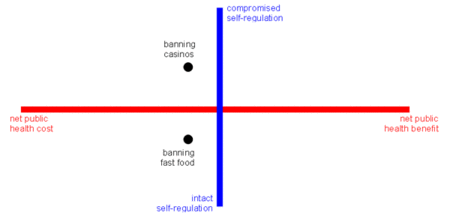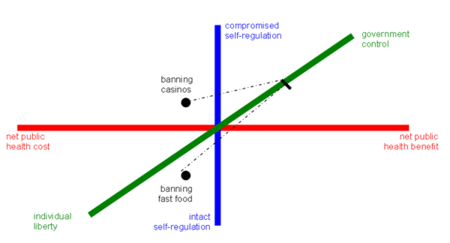Op-Ed/Editorials – Regulations and Personal Liberty – Three Axes to Grind
The views expressed in the Op-Ed/Editorials page are solely the views of the author(s) and do not necessarily reflect the views of the BASIS, its sponsors, or affiliated organizations.
When debates about addiction regulations (e.g., bans on casinos, minimum drinking ages) arise, they are usually framed as a simple question – to regulate or not to regulate – with a cost-benefit analysis used for argument. One side argues that we should regulate such and such because of the harm it can do to people. The other side argues that we shouldn’t regulate such and such (or should regulate it less) because the regulations would harm the community. The good of the people stands as the stated goal on both sides. Take gambling, for example. Should casinos be legalized in a given state? Proponents argue that a casino will bring in jobs and money, thus improving the economy. Opponents argue that the casino will lead to problem gambling and higher crime, harming the community. Both appeal to overall benefit or harm as the basis of deciding whether the regulation (in this case, the legality of certain forms of gambling) ought to stand.
Consequent to such deadlock, science is often called upon to answer whether a given regulation can improve the public’s health enough (or the lack of that regulation harm the public’s health enough) to justify the regulation. In the case of gambling, does legalizing casinos negatively impact the health and standard of living of the public? (1) Would de-regulating slot machines at race tracks save that industry? In this editorial, I wish to explore what role science can play in the debate about addiction-related regulations and consider whether there are borders science cannot or should not cross.
What if science were to reach a state in which it could determine to the last penny and the slightest discomfort avoided, the harms and benefits of a regulation, and the best regulation to implement based on those harms and benefits? For gambling, assume that science could show that having any form of gambling in a community did more harm to its citizens than the financial benefits reaped by such gambling could offset. A complete ban on gambling would do more good than harm to the people in the community. Should that regulation be implemented? Consider a parallel case. Let’s say science could definitively determine that banning all fast food restaurants does the greatest good for the greatest number even when factoring in the economic cost. Should we implement that ban? The science between each of the cases in this thought experiment is identical. Yet I would wager that many people would endorse the ban on gambling but not the ban on fast food.

This suggests that the science of public health alone is not capable of determining the appropriateness of regulations. What’s lacking?
In our thought experiment, all harms and benefits to society were factored in. We were able to pinpoint the effectiveness of the regulation on the public good axis. If that’s not good enough, then there must be some other axis we’re ignoring.
When we think about bans on casinos and fast food, what do we consider? Whether the activity is harmful or not – casinos can foster disordered gambling, and Big Macs can foster obesity and high cholesterol. But equally, we consider whether people need to be saved from themselves. For gambling, many people think that individuals who have problems with gambling cannot control their behavior. This perspective is currently less common for Big Mac over-indulgers. Perhaps, if overeating reaches addiction status, bans on fast food will be as advocated as much as bans on gambling. Clearly, perceptions of compromised self control play a role in these regulations. Currently, the role of self-regulation in addiction is extensively researched but yet to be understood fully (e.g., Koob & Le Moal, 1997). Science might one day get to a point where it could inform us about the role of self-regulation in addiction – let us know whether the Big Mac and blackjack indulgers are equally compromised. Graphically, we can think of public harm/benefit and self-regulation as two different axes along which science can inform addiction regulations. Are these enough?

Let’s consider our fast food and gambling examples again. If you enjoy an occasional Big Mac or card game, should your rights to engage in those behaviors be taken away because you might develop a problem or because your neighbor cannot control her behavior? Science operates at the aggregate – it can tell us probabilistically how great an addiction-related harm is or how addiction tends to develop. For example, we know that approximately 1% of the population develops serious gambling problems (though there is mixed evidence about whether this rate increases when a casino is introduced in a community — see WAGER 9(16)) (Shaffer, LaBrie, LaPlante, Nelson, & Stanton, 2004). We also know that neural systems related to impulsivity and self-regulation are compromised in people with addictions (e.g., Chambers, Taylor, & Potenza, 2003; Potenza et al., 2003). But neither of these findings can tell us when to trade individual liberties for external control.
With most regulations about objects of addiction (i.e., regulations that prevent people from harming themselves), we are really dealing with three axes: 1) cost/benefit — does the regulation improve public health, 2) self-regulation – how compromised are individuals’ abilities to control their behavior in the presence of the object or activity being regulated, and 3) ethical/political — when should we trade individual liberties for external controls?

It is important to recognize the multifaceted nature of the debate about addiction-related regulations in order to understand the role science can play. Research can contribute to the cost/benefit axis, evaluating and improving the effectiveness of regulations. Research might also be able to contribute to the self-regulation axis as we learn more about the level of control people have over their actions. However, only in an ethical context in which personal liberty does not matter can a scientific cost/benefit analysis provide a definitive answer to the appropriateness of a regulation, and only in an ethical context in which personal liberty is protected unless free choice is compromised can the scientific study of self regulation contribute to the debate.
Driving home from work every day across the MA/NH border, I watch motorcyclists pull over and remove their helmets on their way into New Hampshire. As a scientist, I could do a study and learn about the effectiveness of the helmet law in Massachusetts – perhaps traffic fatalities in Massachusetts have decreased, but traffic fatalities have increased in New Hampshire as a result of the increased number of helmetless motorcyclists crossing the border there. But as a scientist, I also have a responsibility to recognize the border between science, ethics, and opinion – where what I can offer as a scientist (e.g., how the regulation relates to traffic fatalities in MA and NH; whether avid motorcyclists can control their freewheeling behavior) stops and what I offer as a private citizen with an opinion (e.g., whether helmets ought to be required by law) begins.
What do you think? Comments on this article can be addressed to Sarah Nelson.
Notes
1. In 1998, science was called upon to answer just this question. The National Gambling Impact Study Commission called on gambling researchers to testify about the social impacts of gambling. Dr. Shaffer pointed out in his testimony before the Commission that “Ultimately, an inquiry of gambling in America is both an economic and social cost benefit analysis. Scientists can provide considerable information about the factors that influence gambling choices, and what happens to people who do gamble. However, science cannot determine the social value of this information.”
References
Chambers, R. A., Taylor, J. R., & Potenza, M. N. (2003). Developmental neurocircuitry of motivation in adolescence: A critical period of addiction vulnerability. American Journal of Psychiatry, 160(6), 1041-1052.
Koob, G. F., & Le Moal, M. (1997). Drug abuse: Hedonic homeostatic dysregulation. Science, 278(5335), 52-58.
Potenza, M. N., Steinberg, M. A., Skudlarski, P., Fulbright, R. K., Lacadie, C. M., Wilber, M. K., et al. (2003). Gambling Urges in Pathological Gambling. Archives of General Psychiatry, 60(8), 828-836.
Shaffer, H. J., LaBrie, R., LaPlante, D., Nelson, S. E., & Stanton, M. V. (2004). The road less travelled: Moving from distribution to determinants in the study of gambling epidemiology. Canadian Journal of Psychiatry, 49(8), 504-516.